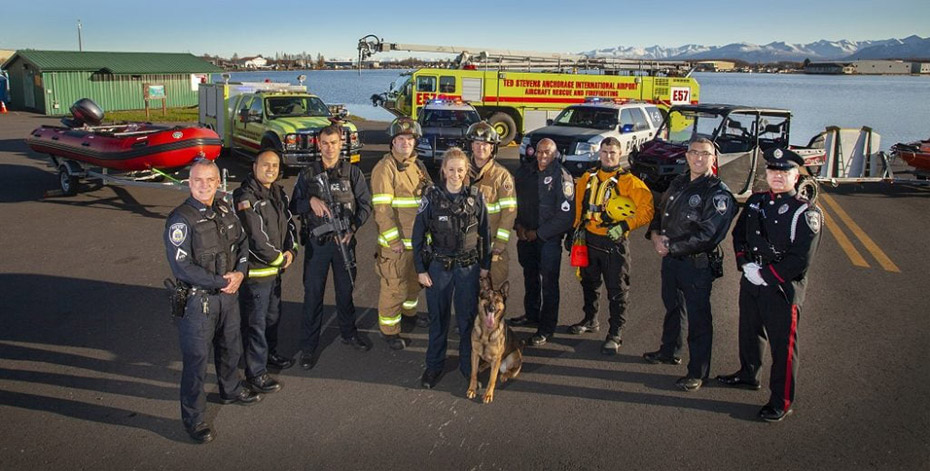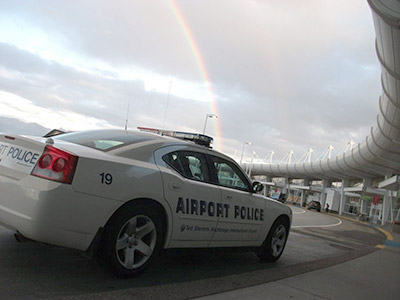Police
Airport Police and Fire officers are state-certified police officers with police and arrest authority throughout the state. Our responsibility is for the general safety of the traveling public and employees at Ted Stevens Anchorage International Airport.

Patrol Duties
Airport police handle a wide variety of law enforcement responsibilities and tasks around the airport – from assisting the public to enforcing municipal, state, and federal laws. These duties also include policing the roadways around the airport property and maintaining security and safety. Officers at the airport conduct drug interdiction, traffic enforcement, OUI enforcement, and various other types of enforcement to ensure the safety of the traveling public. Officers conduct felony and misdemeanor arrests for disorderly conduct, assaults, and domestic violence. With the airport serving as the gateway to Alaska, the Department assists many other police agencies across the state, as well as police agencies from the continental United States. The Ted Stevens Anchorage International Airport is one of the safest places in Alaska due to the diligence of the officers who serve here. Special emphasis is placed on supporting the regulations and policies of the Transportation Security Administration.
Training & Certifications
All airport police officers are certified law enforcement officers in the State of Alaska. For the first year, officers are trained at the Alaska Law Enforcement Training Academy. Training doesn't stop once officers complete the DPS academy. Training includes annual defensive tactics training, firearms qualifications, DUI investigation recertification, Advanced Roadside Impaired Driving Enforcement, ethics training, basic lifesaving skills, crisis intervention training and more. After successfully completing the Alaska Law Enforcement Training Academy, officers will receive an Alaska Police Standards Counsel Certificate. Officers will then be one of the most highly qualified law enforcement officers in the country.
Police Academy

The academy includes:
- Residential, paramilitary environment
- Paid, 17-week program
- Located in Sitka in Southeast Alaska
- Students live in dormitory-style rooms with shared bathroom facilities
- All meals are provided
- Rigorous physical training occurs daily
- Books and study materials are provided
- All successfully completed courses earn college credits
- Students are trained to use handguns and patrol rifle techniques
A typical day includes:
- 0430 – 0510 Wake up
- 0510 – 0630 Physical fitness
- 0630 – 0700 Shower/uniform of the day
- 0700 – 0745 Breakfast
- 0745 – 0755 Flag formation
- 0800* – 1200 Classroom instruction/scenario-based training
- *Monday morning inspection 0800 – 0830
- 1200 – 1300 Lunch
- 1300 – 1700 Classroom instruction/scenario-based training
- 1700 – 1800 Dinner
- 1800 – 1900 Mandatory study hour
- 1900 – 2200 Recruit time (cleaning duties, laundry, contact family)
- 2200 Lights out
Saturdays – Testing and classroom instruction/scenario-based training.
Sundays – Emergency Vehicle Operations Course driving/recruit time.
For firearms training, you'll receive 90 hours of training, which will encompass:
- Glock 17 handgun, Remington 870 shotgun, and patrol rifle
- Low-light training
- Advanced handgun
- Shooting on the move
- Scenario-based training
For defensive tactics training, you'll receive 120 hours of training, which will encompass:
- Techniques of physical arrest
- Ground defense
- Taser
- OC spray
- Expandable baton
- Scenario-based training
You will receive hands-on instruction in the classroom, in the field, and in scenario-based training. Here are some of the training topics covered in the academy.
- Domestic violence
- Alaska Criminal Code
- Search and seizure
- Interview and interrogation
- Crime scene investigation
- Miranda
- Use of force
- Cold water survival
- Search and rescue
- Active shooter
- Emergency Vehicle Operations
